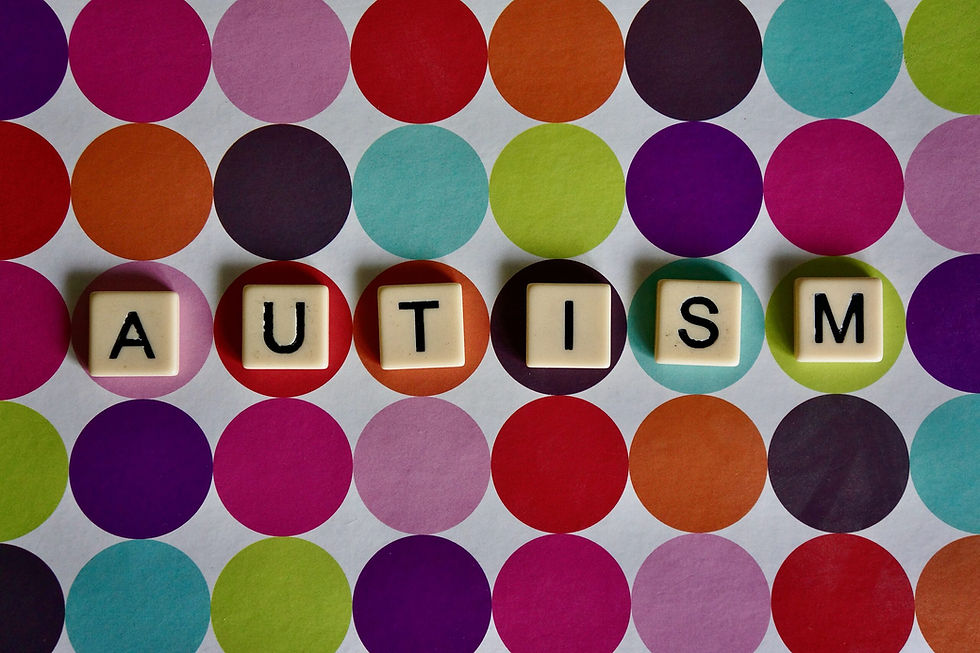An Autism Doctor’s Life Lesson
- Adam Smith
- Sep 29, 2025
- 6 min read
Updated: Oct 2, 2025
Dr. ‘June’ Kong’s life changed 25 years ago with her son’s diagnosis. Now she’s on a mission to improve screening, therapy
When Dr. Xue-Jun Kong arrived in the United States from China some 35 years ago, she planned to pick up where she left off as a pulmonologist at Peking Medical University. Her goal was to get the necessary U.S.-required training, and begin an internship and residency program. But her life would soon take an unexpected turn.
Kong had a baby boy. That was the first detour. And then, around age three or four, her son would be diagnosed as “severely” autistic. He would soon become her focus, both at home and at work.
“Previously, I knew little about autism,” she said. But after her child’s diagnosis, she said, the neurological condition became her “passion.”
“Since I had my boy, my life totally changed.”
Dr. Kong’s career would go deep into neurology and autism research over the next two and a half decades. An assistant professor at Harvard, Kong has delved into autism research and translational medicine. She’s led a diverse team of researchers and doctors to explore therapies and diagnostic tools for autism spectrum, filing six patents and one copyright in the field. Most recently, she became the principal investigator and director of the Synapse Lab at Boston Children’s Hospital earlier this year. The position is an extension of her role at the Synapse Lab for Autism Research at Massachusetts General Hospital, which she founded in 2016.
In an interview with the Sampan about her personal and professional life, Kong spoke about her son, now 28 years old and pursing a graduate degree in mathematics, as well as her goals and focus areas in autism research. At her lab, Kong is zeroing in on both early childhood diagnosis of the neurological condition and fetal diagnosis. She’s also exploring what she calls the “gut-brain connection” for people with autism and various potential therapies. She is focusing in particular on microbiome profiling, eye tracking, electroencephalogram (a device that charts the brain’s electrical changes) data, brain imaging, and immune markers.
The goal, she said, is to spot autism accurately and early so that children can begin therapies sooner.
“The traditional way to diagnose autism is not up until two years old,” she said, and, in real life, it’s often much later. “Like in my son’s case, he didn’t get diagnosed until three to four years old.”

In addition, autism testing in the U.S. typically includes observations and testing by a healthcare provider and questionnaires for caregivers and sometimes a child’s educators, and not objective biomedical markers.
Biomedical markers, she said, in her research can not only be used for early screening and diagnosis, “but it’s also great for sub-typing, because, as you know, no two autistic people are the same. It’s a very diverse group.”
With a toolkit of biomedical tests, she said, researchers may soon be able to better differentiate different types of autism, which is currently viewed as a spectrum that ranges from people who can go through life needing little or no support to those who need extensive help throughout their lives. Some people have highly fluid language abilities, for example, and some may never be able to talk or may have limited ability to talk. Some may have cognitive disabilities while others may be viewed as having genius-like abilities. Some may have profoundly disruptive involuntary body movements while others may be able to go through society with their condition barely noticed.
“We can subtype them and subgroup them,” she said, “for more targeted therapy.”
Kong is beginning clinical trial of fecal transplants as one potential therapeutic option. That procedure could help alter the body’s microbiome — the bacteria, fungi, and viruses that live inside us. Right now, the transplant is mainly used, however, for people with a type of bacterial infection called c. diff, or Clostridioides difficile.
But, she said, it could potentially be used for autism as an “off-label treatment.”
As strange as that might sound to people outside of the field, it’s highly common for doctors to prescribe medicines made originally for other uses – such as for lowering blood pressure – for autistic people. Clinical trials are underway, she said, for using the transplant for autism, adding that she’s hopeful because the therapy is already approved by the Food and Drug Administration for C. diff infections.
What led her to the transplant approach is her focus on what she calls the “gut-brain” axis, which she views as a critical area of research.
“I also study brain connectivity … The brain has kind of circuits – different pathways,” said Dr. Kong.
Neural-hormonal changes, she said, influence autism symptoms, including core symptoms. So, she employs EEG and other brain imaging data to help identify different pathways for insight into how the brain works.
A History of Misconceptions and Persistent Stigma
The study of autism is relatively young and filled with early misconceptions. It was only in 1911 that a now-controversial Swiss psychiatrist, Eugen Bleuler, presented his version of “autism” as a symptom of schizophrenia – a definition that now seems crude and vastly different from today’s view of autism. Three decades later, Johns Hopkins University child psychiatrist Leo Kanner put forth his version of autism, which many view as a starting point for the history of the research. But for a long time throughout England and the U.S. and elsewhere a large number of people diagnosed with autism were categorized as “mentally retarded” -- a term now seen as offensive and inaccurate -- and many were put into institutions. Advances were made in the 1980s and later, but even in the last couple decades, views around autism and inclusion and education of autistic people have been dramatically changing and so have public perceptions about the disorder.
More recently the U.S. has undergone aggressive screening efforts for the condition and the prevalence has rapidly increased. Many people diagnosed with autism today also have secondary diagnoses, such as attention deficit disorder, Down Syndrome, Fragile X syndrome and Tourette syndrome. Autism itself, however, is typically viewed as a neurological condition impairing social and communication abilities and often includes some type of patterned or repetitious behaviors.
Stigma around the condition still persists, despite medical advances, advocacy and awareness. Dr. Kong acknowledged that, anecdotally, discomfort around the disorder is especially persistent in many Asian American communities.
Denial — “we don’t believe our kids have autism” — is one problem, she said. “Secondly, we feel shame to talk about it. … We want to hide the information, even within the family.... But that’s not good. I mean, I think that’s not good for the kids.”
That’s also, why, she said, Asian Americans can sometimes get diagnosed later on, which can lead to a delay in services.
But, she believes, the stigma is steadily decreasing. During the Autism Awareness Symposium at Beth Israel Deaconess Medical Center in April that Kong spearheaded, for example, more than a hundred people — including many Chinese American families — attended to hear Kong and other Harvard-affiliated clinicians, researchers, and psychologists, as well as documentary filmmakers and therapists, discuss the condition in ways both medical and personal. Attendees, she said, came from as far as California and Taiwan.
In her home country of China, however, she said, autism research and acceptance are still “catching up” with the U.S.
“Special education is (quite) behind,” she said, and so are legal protections for special needs students. For example, children with autism may encounter difficulties entering certain elementary schools with strict entrance requirements, which can limit their inclusive educational opportunities.
“People have autism (and) they may not be qualified, then they will lose schooling early on.”
Kong, however, is outspoken about her own son, and, she said, proud of his development over the years – and how he’s largely shaped her career. She now says she’s hopeful her work will contribute to advances in science, diagnoses and therapies for the condition that so changed her own family’s trajectory.
“He was actually diagnosed as severely autistic,” she said of her son. “Certainly, I did a lot of medical and educational intervention. And I can see his progress. Autism is not unchangeable. Previously people (thought) nothing changed. But that’s not true.”
This story contains some minor edits made after publication online.









Comments